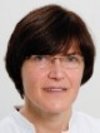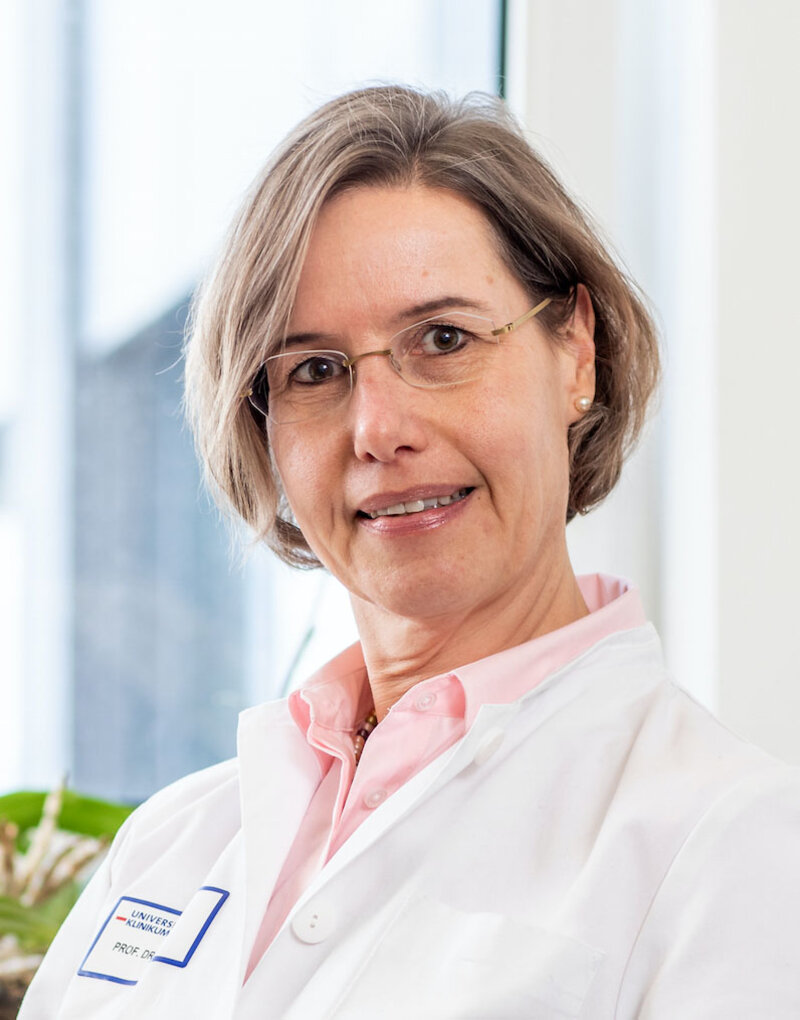Pahl Laboratory
Section of Molecular HematologyTeam
Principal Investigator
Prof. Dr. Heike L. Pahl
Chair: Section of Molecular Hematology
Department of Hematology / Oncology
Phone: +49 (0) 761 270-63400
Fax: +49 (0) 761 270-96-71910
heike.pahl@uniklinik-freiburg.de
Secretariat: Adriana Schlegel
Phone: +49 (0) 761 270-61060
Fax: +49 (0) 761 270-96 71910
adriana.schlegel@uniklinik-freiburg.de

Dr. Albert Gründer
Post-Doc
Telefon +49 (0) 761 270-71820
Telefax +49 (0) 761 270-96-71910
albert.gruender@uniklinik-freiburg.de

Dr. med. Julius Wehrle
Post-Doc
Telefon +49 (0) 761 270-71960 /-71880
Telefax +49 (0) 761 270-96-71910
julius.wehrle@uniklinik-freiburg.de

Dr. med. Felix Staehle
Telefon +49 (0) 761 270-71800
Telefax +49 (0) 761 270-96-71910
hans.felix.staehle@uniklinik-freiburg.de

Dr. med. Sarolta Bojtine Kovacs
Telefon +49 (0) 761 270-71811
Telefax +49 (0) 761 270-96-71910
sarolta.kovacs@uniklinik-freiburg.de

Christoph Köllerer
Arzt
Telefon +49 (0) 761 270-71800
Telefax +49 (0) 761 270-96-71910
christoph.koellerer@uniklinik-freiburg.de
cand med. Philipp Eble
philipp.eble@uniklinik-freiburg.de
cand. med. Katharina Gellrich
katharina.gellrich@uniklinik-freiburg.de
Mirjam Höneß
cand. med.
Telefon +49 (0) 761 270-71800
mirjam.hoeness@uniklinik-freiburg.de
cand. med. Sofia Kovalchuk
sofia.kovalchuk@uniklinik-freiburg.de
cand. med. Anja Müller
anja.mueller@uniklinik-freiburg.de
Dr. med. Anne Marie Staehle
Telefon +49 (0) 761 270-71800
anne.staehle@uniklinik-freiburg.de
Ph.D cand. Jana Schulze
jana.schulze@uniklinik-freiburg.de

cand. med. Jean-Luca Funk
Telefon +49 (0) 761 270-71811
jean-luca.funk@uniklinik-freiburg.de
cand. med. Leonie Wolf
Telefon +49 (0) 761 270-71800
leonie.wolf@uniklinik-freiburg.de

Martina de Groot
Technical Assistant
Telefon +49 (0) 761 270-71990
Telefax +49 (0) 761 270-96-71910
martina.de-groot@uniklinik-freiburg.de

Beate Krauß
Technical Assistant
Telefon +49 (0) 761 270-71980
Telefax +49 (0) 761 270-96-71910
beate.krauss@uniklinik-freiburg.de
cand. med. Franziska Zell
franziska.zell@uniklinik-freiburg.de
Research Projects
The transcription factor nuclear factor erythroid-2 (NF-E2) is expressed in hematopoietic stem cells as well as in myeloid, erythroid and megakaryocytic precursors. NF-E2 deficient mice display marked anemia at birth and die perinatally due to thrombopenia, demonstrating an essential role for NF-E2 in both in erythropoiesis and platelet formation. We have previously shown that NF-E2 is overexpressed in the vast majority of patients with Myeloproliferative Neoplasms (MPNs). However, the effect of augmented transcription factor activity has not been studied in vivo. We therefore engineered two independent transgenic mouse lines expressing human NF-E2 under the control of the vav-Promoter, which has previously been shown to direct transgene expression in hematopoietic stem cells as well as in precursor cells of all lineages.
The two founder lines show overlapping but distinct phenotypes. Epo-independent colony formation, a pathognomonic feature of polycythemia vera, is significantly increased in NF-E2 transgenic animals. Bone marrow histopathology shows findings characteristically seen in MPNs, including the presence of increased megakaryopoiesis with cytologically abnormal forms, often in clusters. Both NF-E2 transgenic strains display significantly increased mortality. Upon autopsy, between 15 and 20% of mice in both strains present with major gastrointestinal bleeding in conjunction with splenic atrophy. Histopathological examination of all spleens revealed mild to moderately expanded red pulp with increased numbers of iron containing histiocytes. This observation indicates increased red cell destruction and may explain the fact that neither hematocrit nor hemoglobin are elevated in NF-E2 transgenic animals. At 18 months of age, one mouse developed acute leukemia, which is currently being phenotyped. In summary, in a murine model moderate NF-E2 overexpression causes a phenotype resembling Essential Thrombocythemia. In addition, our preliminary data indicate that NF-E2 overexpression may predispose to the development of acute leukemia.
Current Lab Members on Project
- Dr. rer. nat. Titiksha Basu
- Beate Krauß, Technical Assistant
- Martina de Groot, Technical Assistant
Alumni
- Dr. med. Dr. rer. nat. Jonas S. Jutzi
- Sandra Kaiser, Dipl.-Biol. (2018)
- Dr. med. Kai Kaufmann, (M.D. 2012)
- Tobias Hadlich, (M.D. 2012)
- Kien-Binh Pham, (M.D. pending)
- Monika Gothwal, (Ph. D. 2012)
- Sarah Kayser, (M.D. 2012)
- Jan Marx, (M.D. 2012)
- Laura Vandré, (M.D. 2012)
Literature
- Jutzi JS, Bogeska R, Nikoloski G, Schmid CA, Seeger TS, Stegelmann F, Schwemmers S, Gründer A, Peeken J, Gothwal M, Wehrle J, Aumann K, Hamdi K, Dierks, C, Wang W, Döhner K, Jansen JH, Pahl HL (2013) MPN patients harbor recurrent truncating mutations in transcription factor NF-E2, J. Ex. Med, 210: 1003 - 1019. (PDF-file)
- Kaufmann KB, Gründer A, Hadlich T, Wehrle J, Gothwal M, Bogeska R, Seeger TS, Kayer S, Pham KB, Jutzi JS, Ganzenmüller L, Steinemann D, Schlegelberger B, Wagner JM, Jung M, Will B, Steidl U, Aumann K, Werner M, Günther T, Schüle R, Rambaldi A, Pahl HL, (2012) Overexpression of transcription factor NF-E2: a novel murine model of myeloproliferative neoplasms, J. Exp. Med, 209 (1): 35 - 50. (PDF-file)
- Wang W, Schwemmers S, Hexner EO, Pahl HL (2010) AML1 is overexpressed in patients with myeloproliferative neoplasms and mediates JAK2V617F-independent overexpression of NF-E2. Blood, 116: 254 - 266 (PDF-file)
- Goerttler PS, Kreutz C, Donauer J, Faller D, Maiwald T, März E, Rumberger B, Sparna T, Schmitt-Gräff A, Wilpert J, Timmer J, Walz G, Pahl HL (2005) Gene Expression Profiling in Polycythemia vera: Overexpression of transcription factor NF-E2., Br. J. Haematol, 129: 138-150. (PDF-file)
The molecular etiology of Polycythemia vera (PV) remains unknown, despite the recent description of a point mutation in the JAK2 kinase (JAK2V617F).Gene expression profiling has been successfully used to reveal candidate genes involved in disease development.We thus performed cDNA microarray analysis on 40 patients with PV 50 healthy controls and 12 patients with secondary erythrocytosis (SE) (Goerttler, 2005).253 genes upregulated and 391 genes downregulated more than 1.5-fold in PV compared to healthy controls (p < 0.01) were identified. Of these, the transcription factor NF-E2, is overexpressed between 2- and 40-fold in PV patients. In PV bone marrow, NF-E2 is overexpressed in megakaryocytes, erythroid and granulocytic precursors. It has been shown that overexpression of NF-E2 leads to the development of Epo-independent erythroid colonies and that ectopic NF-E2 expression can reprogram monocytic cells towards erythroid and megakaryocytic differentiation.Transcription factor concentration may thus control lineage commitment. We therefore propose that in PV patients elevated concentrations of NF-E2 lead to an overproduction of erythroid and, in select patients, megakaryocytic cells/platelets. In this model the level of NF-E2 overexpression determines both the severity of erythrocytosis and the concurrent presence or absence of thrombocytosis.The recent description of the Jak2V617F mutation in PV patients raises the question whether this allele exerts its effect on the malignant clone in part through inducing NF-E2 expression.Both the molecular mechanism leading to NF-E2 overexpression and its effect on human hematopoiesis are not known. Therefore, it is the aim of this project to investigate the cause of NF-E2 overexpression in PV and the effect of NF-E2 overexpression in hematopoietic cells.Based on the following hypotheses, the specific aims of this project are therefore:
Hypothesis 1: NF-E2 is required for the Epo-independent growth of PV cells
Specific Aim 1: To modulate NF-E2 expression via siRNA knock down and retroviral or lentiviral transduction and examine the consequences on Epo-independent growth in vitro.
Hypothesis 2: NF-E2 and PRV-1 overexpression in PV are mediated by the Jak2V617F allele
Specific Aim 2: To introduce Jak2 wt and V617F alleles in vivo and in vitro and examine the effects on NF-E2 and PRV-1 expression in various models.
Current Lab Members on the Project
- Dr. Albert Gründer, Post-Doc
- Dr. med. Julius Wehrle, Post-Doc
- Christoph Koellerer, Arzt
- Anne Marie Omlor, cand. med.
- Jean-Luca Funk, cand. med.
Alumni
- Dr. Ruzhica Bogeska, Post doc (Ph. D. 2012)
- Laura Siegwart, M.D. student (2020)
- Lara Rheinemann (2014)
- Dr. Angela Magin
- Manuel Mutschler, (M.D. 2009)
- Roland Roelz, (M.D. 2010)
- Martina Buerge, (M.D. 2011)
- Christian Arnold, (M.D. 2013)
- Aitomi Essig, (M.D. 2012)
- Dr. Thalia Seeger, Post doc
Literature
- Mutschler M, Magin AS, Buerge M, Roelz R, Schanne DH, Will B, Pilz I, Migliaccio AR, Pahl HL (2009) NF-E2 Overexpression Delays Erythroid Maturation and Increases Erythrocyte Production. , Br. J. Haematol, 146: 203-217. (PDF-file)
Goerttler PS, Kreutz C, Donauer J, Faller D, Maiwald T, März E, Rumberger B, Sparna T, Schmitt-Gräff A, Wilpert J, Timmer J, Walz G, Pahl HL (2005) Gene Expression Profiling in Polycythemia vera: Overexpression of transcription factor NF-E2., Br. J. Haematol, 129: 138-150. (PDF-file)
Hypothesis 1: Elevated NFE2 activity promotes leukemogenesis by increasing ROS levels and causing DNA damage, thereby enhancing the mutation rate in hematopoietic stem cells.
Aim 1: To determine reactive oxygen species (ROS) levels and DNA damage in the absence or presence of wt-NFE2 or NFE2 mutants in cell lines as well as in our NFE2 MPN murine models and in primary MPN patient cells.
Rationale: We have demonstrated that elevated NFE2 activity leads to the subsequent acquisition of both structural genomic changes and point mutations. NFE2 has previously been implicated in regulating transcription of cytoprotective genes and it has been proposed that NFE2 activity determines ROS levels during megakaryocytic maturation.
Hypothesis 2: Altered NFE2 activity in MPN and AML patients perturbs the NFE2 / NFE2L2 homeostasis, which increases cellular stress and promotes leukemogenesis.
Aim 2: To determine genome wide DNA occupancy of NFE2 and NFE2L2 by ChIP-seq and their impact on transcriptome as well as chromatin accessibility by RNA- and ATAC-seq in cell lines expressing different combinations of both transcription factors: only wt-NFE2 or NFE2L2, both factors, as well as each alone and both in the presence of different NFE2 mutants.
Rationale: The DNA binding motifs of NFE2 and NFE2L2 are almost identical and it has been proposed that NFE2 and NFE2L2 compete for binding at loci encoding cytoprotective genes. However, this model has only been tested in megakaryocytes and on selected genes, neither in a genome wide approach nor in hematopoietic stem cells, which are the cell population in which leukemic transformation occurs.
Hypothesis 3: Mutant NFE2 proteins exert their effects by forming altered protein-protein interactions.
Aim 3: To compare the interactions of wild-type and mutant NFE2 with other proteins.
Rationale: NFE2 has been demonstrated to interact with various other transcriptional activators, co-factors and epigenetic modifiers, including ITCH-1, NEDD4 and YAP, NAPP2, phosphorylated JNK, CBP/p300 and TAF II 130. Because the truncating leukemia-promoting NFE2 mutations lack a large proportion of the protein but nonetheless augment wt-NFE2 activity, and some point mutants act as dominant negatives, we propose that the protein-protein interactions undergone by NFE2 mutants differ from those of wild-type NFE2.
Current Lab Members on the Project
- Dr. Albert Gründer, Post-Doc
- Jean-Luca Funk, cand. med.
- Christoph Koellerer, Arzt
- Anne Marie Omlor, cand. med.
Alumni
- Dr. Sven Schwemmers, Post doc (Ph. D. 2010)
- Dr. Wei Wang, Post doc (Ph. D. 2010)
Literature
- Wang W, Schwemmers S, Hexner EO, Pahl HL (2010) AML1 is overexpressed in patients with myeloproliferative neoplasms and mediates JAK2V617F-independent overexpression of NF-E2. Blood, 116: 254 - 266. (PDF-file)
- Schwemmers S, Will B, Waller CF, Abdulkarim K, Johansson P, Andreasson B, Pahl HL (2007) JAK2V617F-negative ET patients do not display constitutively active JAK/STAT signaling. Exp Hematol, 35 (11):1695 -1703. (PDF-file)
- Griesshammer M, Klippel S, Strunck E, Temerinac S, Mohr U, Heimpel H, Pahl HL (2004) PRV-1 mRNA expression discriminates two types of Essential Thrombocythemia., Ann. Hematol., 83: 364-370. (PDF-file)
- Goerttler PS, Steimle C, März E, Johansson PL, Andreasson B, Griesshammer M, Gisslinger H, Heimpel H, Pahl HL (2005) The Jak2V617F mutation, PRV-1 overexpression and EEC formation define a similar cohort of MPD patients. Blood, 106: 2862-2864. (PDF-file)
- Goerttler PS, März E, Johansson PL, Andreasson B, Kutti J, Moliterno AR, Marchioli R, Spivak JL, Pahl HL for the MPD Research Consortium (2005) Thrombotic and Bleeding Complications in Four Subpopulations of Patients with ET Defined by c-Mpl Protein Expression and PRV-1 mRNA Levels. Haematologica/The Hematology Journal, 90: 851-853. (PDF-file)
In this project we are examining the role of aberrant chromatin remodelling in the pathophysiology of myeloproliferative neoplasms (MPN). In the first two funding periods we defined two functionally distinct classes of NFE2 mutations in patients with myeloproliferative neoplasms (MPN) and acute myeloid leukemia (AML), both of which confer a MPN phenotype with spontaneous transformation to AML in mouse models. Furthermore, we have demonstrated that elevated expression of the transcription factor NFE2 in MPN patients is regulated by two distinct epigenetic pathways. Preliminary data show that the presence of NFE2 is sufficient to alter histone modifications at distinct loci thereby inducing transcription of novel target genes. Therefore, the first goal of the coming funding period is to integrate changes in the transcriptome, histone modifications and chromatin accessibility conferred by wt-NFE2 and the two types of NFE2 mutations, to understand how both enhanced and diminished NFE2 activity alters the epigenetic landscape to promote leukemic transformation. Secondly, we hypothesise, that differences in chromatin accessibility and activity of regulatory elements in the hematopoietic stem cell incurring the JAK2V617F mutation account for the variety of clinical presentations seen among individuals carrying this identical mutation. We will therefore compare genome-wide chromatin accessibility and gene expression in JAK2V617F cells from MPN patients to residual, wild-type cells of the same individual as well as to cells from individuals with clonal hematopoiesis of indeterminate potential (CHIP) and to healthy controls. These data will allow us to discriminate between two alternative pathophysiological models of disease initiation and progression from CHIP to MPN.
Goals
(1) We hypothesise that NFE2 mutants cause leukemic transformation through distinct alterations in chromatin accessibility, histone modification and gene expression. Consequently, we propose to analyse changes in chromatin accessibility, histone modifications, and in the transcriptome caused by wild-type NFE2 alone and by the presence of either type I or type II NFE2 mutants.
(2) We hypothesise that the JAK2V617F mutation causes CHIP in some individuals and PV in others because the hematopoietic stem cells incurring the mutation differ in chromatin accessibility of regulatory elements. We will therefore compare chromatin accessibility and gene expression in pure JAK2V617F mutant cells to residual wild-type cells of the same individual in JAK2V617F-CHIP, JAK2V617F-PV and to wild-type healthy control cells.
Current Lab Members on the Project
- Christoph Koellerer, Arzt
- Anne Marie Omlor, cand. med.
- Felix Staehle, cand. med.
Alumni
- Jan Peeken, M.D. (2018)
- Dr. Thalia Seeger
Further Information
2024
- Nikolaos Karantzelis, M.Sc., Ph.D.
- Samuel Vorbach
2023
- Georg Vladimirov (M. A. 2023)
2022
- Hannah Bertrand (M. D. pending)
2020
- Dr. med. Lukas Böckelman (M. D. 2020)
- Dr. med. Jakob Meyer (M.D. 2020)
- Dr. med. Elias Schoenwandt (M.D. 2020)
- Dr. med. Laura Siegwart (M.D. 2020)
2019
- Dr. med. rer. nat. Jonas S. Jutzi, M.D., Ph.D.
- Dr. med. dent. Max Pellmann (D.M.D. 2019)
2018
- Philipp Hafner (M.A. 2018)
- Dr. med. Johannes Heinemann (M.D. 2018)
- Dr. rer. nat. Sandra Kaiser (Ph. D. 2018)
- Jenny Ostendorp (M.A. 2018)
- Dr. med. Jan Peeken (M.D. 2018)
2017
- Dr. med. Karolin Kircher (geb. Keller) (M.D. 2017)
2016
- Vanessa Zimmermann (M.A. 2016)
2014
- Dr. med. Lucas Ganzenmueller (M.D. 2014)
- Dr. med. Kien-Binh Pham (M.D. 2014)
- Lara Rheinemann (M.A. 2014)
2013
- Dr. med. Christian Arnold (M.D. 2013)
2012
- Dr. Ruzhica Bogeska (Ph. D. 2012)
- Dr. med. Aitomi Essig (M.D. 2012)
- Dr. Monika Gothwal (Ph. D. 2012)
- Dr. med. Tobias Hadlich (M.D. 2012)
- Dr. med. Kai Kaufmann (M.D. 2012)
- Dr. med. Jan Marx (M.D. 2012)
- Corina Schmid (M.A. 2012)
- Dr. med. Laura Vandré (M.D. 2012)
2011
- Dr. med. Martina Buerge (M.D. 2011)
2010
- Dr. med. Roland Roelz (M.D. 2010)
- Dr. rer. nat. Sven Schwemmers (Ph. D. 2010)
2009
- Dr. med. Manuel Mutschler (M.D. 2009)
- Dr. rer. nat. Britta Will (Ph. D. 2009)
2006
- Dr. med. Philip Stein (M.D. 2006)
2005
- Dr. rer. nat. Philipp Goerttler (Ph. D. 2005)
- Dr. med. Friederike Schneider (M.D. 2005)
- Dr. rer. nat. Cordula Steimle (Ph. D. 2005)
2003
- Dr. med. Christoph Coch (M.D. 2003)
- Dr. rer. nat. Steffen Klippel (Ph. D. 2003)
2002
- Dr. med. Karsten Bartels (M.D. 2002)
2001
- Dr. med. Sabine Diehl (M.D. 2001)
- Dr. rer. nat. Alexander Knorre (Ph. D. 2001)
2000
- Dr. med. Stefan Buchkremer (M.D. 2000)
- Dr. med. Monika Fleckenstein (M.D. 2000)
- Dr. med. Tobias Meyer-ter-Vehn (M.D. 2000)
1999
- Dr. med. Tanja Kaiser (M.D. 1999)
- Dr. med. Sabine Röder (M.D. 1999)
1998
- Dr. med. Esther Godi (M.D. 1998)
- Dr. med. Anja Münzenmaier (M.D. 1998)
- Dr. med. Gabriele Rapp (M.D. 1998)
1997
- Dr. med. Jörg Meerpohl (M.D. 1997)
Dr. Angela Magin (Post-Doc) | Dr. Thalia Seeger (Post-Doc) | Dr. med. Snezana Temerinac (Post-Doc) | Franziska Zipfel (MTA)
Selected publications (out of 127 total)
- Clemens Böckelmann, Lukas, Titiksha Basu, Albert Gründer, Wei Wang, Jan Breucker, Sandra Kaiser, Andrea Pichler, und Heike Luise Pahl. „Concomitant Constitutive LNK and NFE2 Mutation with Loss of Sumoylation in a Case of Hereditary Thrombocythemia“. Haematologica 106, Nr. 4 (1. April 2021): 1158–62. https://doi.org/10.3324/haematol.2020.246587.
- Siegwart, Laura C., Sven Schwemmers, Julius Wehrle, Christoph Koellerer, Thalia Seeger, Albert Gründer, und Heike L. Pahl. „The Transcription Factor NFE2 Enhances Expression of the Hematopoietic Master Regulators SCL/TAL1 and GATA2“. Experimental Hematology 87 (Juli 2020): 42-47.e1. https://doi.org/10.1016/j.exphem.2020.06.004.
- Staehle, Hans F., Johannes Heinemann, Albert Gruender, Anne M. Omlor, Heike Luise Pahl, und Jonas Samuel Jutzi. „Jmjd1c Is Dispensable for Healthy Adult Hematopoiesis and Jak2V617F-Driven Myeloproliferative Disease Initiation in Mice“. PloS One 15, Nr. 2 (2020): e0228362. https://doi.org/10.1371/journal.pone.0228362.
- Vorbach S, Gründer A, Zhou F, Koellerer C, Jutzi JS, Simoni M, Riccetti L, Valk PJ, Sanders MA, Müller-Tidow C, Nofer JR, Pahl HL, Potì F.
Enhanced expression of the sphingosine-1-phosphate-receptor-3 causes acute myelogenous leukemia in mice.
Leukemia. 34, Nr. 3 (März 2020): 721–34. https://doi.org/10.1038/s41375-019-0577-7. - Sies, Katharina, Corinna Spohr, Albert Gründer, Rumyana Todorova, Franziska Maria Uhl, Julia Huber, Robert Zeiser, u. a.
„Gab2 Is Essential for Transformation by FLT3-ITD in Acute Myeloid Leukemia“. HemaSphere 3, Nr. 2 (April 2019): e184. https://doi.org/10.1097/HS9.0000000000000184. - Thimme R, Pahl HL, Werner K, Nagel IE, Bruckner-Tuderman L.
[Structured Career Pathways in the University Medicine - From Promotion to Clinician Scientist Programs].
Dtsch Med Wochenschr. 2019 Apr;144(7):489-493. doi: 10.1055/a-0851-5750. Epub 2019 Mar 29. German. - Jutzi JS, Basu T, Pellmann M, Kaiser S, Steinemann D, Sanders MA, Hinai AA, Zeilemaker A, Kovacs SB, Koellerer C, Ostendorp J, Aumann A, Wang W. Rafoux E, Cassinat B, Bullinger L, Schlegelberger B, Valk PJM, Pahl HL (2019)
Altered NFE2 activity predisposes to leukemic transformation and myelosarcoma with AML-specific aberrations.
Blood. 2019 Apr 18;133(16):1766-1777. doi: 10.1182/blood-2018-09-875047. Epub 2019 Feb 12. - Javorniczky NR, Waller CF, Pahl HL, von Bubnoff N, Becker H.
Water pipe smoking as a cause of secondary erythrocytosis.
Oxf Med Case Reports. 2019 May 31;2019(5):omz027. doi: 10.1093/omcr/omz027. eCollection 2019 May. - Jutzi JS, Kleppe M, Dias J, Staehle HF, Shank K, Teruya-Feldstein J, Gambheer SMM, Dierks C, Rienhoff HY, Levine RL, Pahl HL (2018), LSD1 Inhibition Prolongs Survival in Mouse Models of MPN by Selectively Targeting the Disease Clone., HemaSheres 2: 3(e54)
- Peeken JC, Jutzi JS, Wehrle J, Koellerer C, Staehle F, Becker H, Schoenwandt E, Seeger TS, Schanne DH, Gothwal M, Ott CJ, Gründer A, Pahl HL (2018) Two novel epigenetic pathways regulate NFE2 overexpression in myeloproliferative neoplasms., Blood, 131:2065-2073.
- Gothwal M, Wehrle J, Aumann K, Zimmermann V, Gründer A, Pahl HL, (2016)
A novel role for nuclear factor-erythroid 2 in erythroid maturation by modulation of mitchondrial autophagy Haematologica
Haematologica September 2016 - Klein C, Zwick A, Kissel S, Forster CU, Pfeifer D, Follo M, Illert AL, Decker S, Benkler T, Pahl HL, Oostendorp RA, Aumann K, Duyster J, Dierks C (2016) Ptch2 loss drives myeloproliferation and myeloproliferative neoplasm progression. J Exp Med; 213 (2): 273-290. http://dx.doi.org/10.1084/jem.20150556
- Geyer H, Scherber R, Kosiorek H, Dueck AC, Kiladjian JJ, Xiao Z, Slot S, Zweegman S, Sackmann F, Fuentes AK, Hernandez-Maraver D, Döhner K, Harrison CN, Radia D, Muxi P, Besses C, Cervantes F, Johansson PL, Andreasson B, Rambaldi A, Barbui T, Bonatz K, Reiter A, Boyer F, Etienne G, Ianotto JC, Ranta D, Roy L, Cahn JY, Maldonado N, Barosi G, Ferrari ML, Gale RP, Birgegard G, Xu Z, Zhang Y, Sun X, Xu J, Zhang P, Te Boekhorst PA, Commandeur S, Schouten H, Pahl HL, Griesshammer M, Stegelmann F, Lehmann T, Senyak Z, Vannucchi AM, Passamonti F, Samuelsson J, Mesa RA (2016) Symptomatic Profiles of Patients With Polycythemia Vera: Implications of Inadequately Controlled Disease. J Clin Oncol; 34 (2): 151-159. http://dx.doi.org/10.1200/JCO.2015.62.9337
- Jutzi JS, Pahl HL (2015) The Hen or the Egg: Inflammatory Aspects of Murine MPN Models. Mediat Inflamm; 101987-101987. http://dx.doi.org/10.1155/2015/101987
- Hexner EO, Mascarenhas J, Prchal J, Roboz GJ, Baer MR, Ritchie EK, Leibowitz D, Demakos EP, Miller C, Siuty J, Kleczko J, Price L, Jeschke G, Weinberg R, Basu T, Pahl HL, Orazi A, Najfeld V, Marchioli R, Goldberg JD, Silverman LR, Hoffman R (2015) Phase I dose escalation study of lestaurtinib in patients with myelofibrosis. Leukemia Lymphoma; 56 (9): 2543-2551. http://dx.doi.org/10.3109/10428194.2014.1001986
- Gajer JM, Furdas SD, Grunder A, Gothwal M, Heinicke U, Keller K, Colland F, Fulda S, Pahl HL, Fichtner I, Sippl W, Jung M (2015) Histone acetyltransferase inhibitors block neuroblastoma cell growth in vivo. Oncogenesis; 4 (online): e137. http://dx.doi.org/10.1038/oncsis.2014.51
- Essig A, Duque-Afonso J, Schwemmers S, Pahl HL, Lübbert M (2014) The AML1/ETO target gene LAT2 interferes with differentiation of normal hematopoietic precursor cells. Leukemia Res; 38 (3): 340-345. http://dx.doi.org/10.1016/j.leukres.2013.12.014
- Rheinemann L, Seeger TS, Wehrle J, Pahl HL (2014) NFE2 regulates transcription of multiple enzymes in the heme biosynthesis pathway. Haematologica; 99 (10): e208-e210. http://dx.doi.org/10.3324/haematol.2014.106393
- Wehrle J, Pahl HL, von Bubnoff N (2014) Ponatinib: a third-generation inhibitor for the treatment of CML. Recent Results Cancer Res; 201: 99-107. http://dx.doi.org/10.1007/978-3-642-54490-3_5
- Jutzi JS, Bogeska R, Nikoloski G, Schmid CA, Seeger TS, Stegelmann F, Schwemmers S, Gründer A, Peeken J, Gothwal M, Wehrle J, Aumann K, Hamdi K, Dierks, C, Wang W, Döhner K, Jansen JH, Pahl HL (2013) MPN patients harbor recurrent truncating mutations in transcription factor NF-E2, J. Ex. Med, 210: 1003-1019. (PDF-file)
- Aumann K, Frey AV, May AM, Hauschke D, Kreutz C, Marx JP, Timmer J, Werner M, Pahl HL, (2013) Subcellular mislocalization of the transcription factor NF-E2 in erythroid cells discriminates pre-fibrotic primary myelofibrosis from essential thrombocythemia. Blood, 122: 93-99. (PDF-file)
- Lindner SE, Wissler M, Gründer A, Aumann K, Borner C, Charvet C, Villunger A,Pahl HL , Maurer U (2013) Increased leukocyte survival and accelerated onset of lymphoma in absence of MCL-1 S159-phosphorylation. Oncogene, 2013: 1-4. (PDF-file)
- Jovanovic JV, Ivey A, Vannucchi AM, Lippert E, Oppliger Leibundgut E, Cassinat B, Pallisgaard N, Maroc N, Hermouet S, Nickless G, Guglielmelli P, van der Reijden BA, Jansen JH, Alpermann T, Schnittger S, Bench A, Tobal K, Wilkins B, Cuthill K, McLornan D, Yeoman K, Akiki S, Bryon J, Jeffries S, Jones A, Percy MJ, Schwemmers S, Gruender A, Kelley TW, Reading S, Pancrazzi A, McMullin MF, Pahl HL, Cross NCP, Harrison CN, Prchal JT, Chomienne C, Kiladjian JJ, Barbui T, Grimwade D (2013) Establishing Optimal Quantitative-Polymerase Chain Reaction Assays for Routine Diagnosis and Tracking of Minimal Residual Disease in JAK2-V617F associated Myeloproliferative Neoplasms: A Joint European LeukemiaNet; (COST Action BM0902) Study. Leukemia, 27: 2032-2039. (PDF-file)
- Wehrle J, Seeger TS, Schwemmers S, Pfeifer D, Bulashevska A , Pahl HL (2013) Transcription factor NF-E2 mediates expression of the cytoine IL8, a known predictor of inferior outcome in MPN patients. Haematologica, 98: 1073-1080. (PDF-file)
- Bogeska R, Pahl HL (2013) Elevated NF-E2 levels promote Epo-independent erythroid maturation and recapitulate the HSC and CMP expansion observed in polycythemia vera patients. Stem Cells Translational Medicine, 2: 112-117. (PDF-file)
- Labi V, Bertele D, Woess C, Tischner D, Bock FJ, Schwemmers S, Pahl HL, Geley S, Kunze M, Niemeyer CM, Villunger A, Erlacher M (2013) Haematopoietic Stem Cell Survival and Transplantation Efficacy is Limited by the BH3-only Proteins Bim and Bmf, EMBO Mol. Med, 5: 122-126. (PDF-file)
- Wöhrle FU, Halbach S, Aumann K, Schwemmers S, Braun S, Auberger P, Schramek D, Penninger JM, Laßmann S, Werner M, Waller CF, Pahl HL, Zeiser R, Daly RJ, Brummer T (2013) Gab2 signaling in chronic myeloid leukemia cells confers resistance to multiple Bcr-Abl inhibitors. Leukemia, 27: 118-129. (PDF-file)
- Emanuel RM, Dueck AC, Geyer HL, Kiladjian JJ, Slot S, Zweegman S, te Boekhorst PA, Commandeur S, Schouten HC, Sackmann F, Kerguelen Fuentes A, Hernández-Maraver D, Pahl HL, Griesshammer M, Stegelmann F, Doehner K, Lehmann T, Bonatz K, Reiter A, Boyer F, Etienne G, Ianotto JC, Ranta D, Roy L, Cahn JY, Harrison CN, Radia D, Muxi P, Maldonado N, Besses C, Cervantes F, Johansson PL, Barbui T, Barosi G, Vannucchi AM, Passamonti F, Andreasson B, Ferarri ML, Rambaldi A, Samuelsson J, Birgegard G, Tefferi A, Mesa RA. (2012) Myeloproliferative neoplasm (MPN) symptom assessment form total symptom score: prospective international assessment of an abbreviated symptom burden scoring system among patients with MPNs.J. Clin. Oncol. 30: 4098-4103. (PDF-file)
- Pahl HL , (2012) A JAK in the cell cycle. Blood, 119 :1096-1097 (PDF-file)
- Kaufmann KB, Gründer A, Hadlich T, Wehrle J, Gothwal M, Bogeska R, Seeger TS, Kayer S, Pham KB, Jutzi JS, Ganzenmüller L, Steinemann D, Schlegelberger B, Wagner JM, Jung M, Will B, Steidl U, Aumann K, Werner M, Günther T, Schüle R, Rambaldi A, Pahl HL , (2012) Overexpression of transcription factor NF-E2: a novel murine model of myeloproliferative neoplasms. J. Exp. Med, 209 (1): 35 - 50 (PDF-file)
- Kroeze LI, Nikoloski G, da Silva-Coelho P, van Hoogen P, Stevens-Linders E, Kuiper RP, Schnittger S, Haferlach T, Pahl HL , van der Reijden BA, Jansen JH (2012) Genetic defects in PRC2 components other than EZH2 are not common in myeloid malignancies., Blood, 119: 1318 - 1319. (PDF-file)
- Fleischman AG, Aichberger KJ, Bumm TG, Petersen CL, Doratotaj S, Vasudevan KB, LaTocha DH, Loriaux MM, Pahl HL , Silver RT, Agarwal A, O’Hare T, Druker BJ, Bagby CG, Deininger MW (2011) Tumor necrosis factor-alpha facilitates clonal expansion of JAK2V617F positive cells in myeloproliferative neoplasms, Blood, 118 (24): 6392 - 6398. (PDF-file)
- Duque-Afonso J, Solari L, Essig A, Berg T, Pahl HL , Lübbert M. (2011) Regulation of the adaptor molecule LAT2, an in vivo target gene of AML1/ETO (RUNX1/RUNX1T1), during myeloid differentiation. British J. Haematol, 153 :612 – 622. (PDF-file)
- Wang W, Schwemmers S, Hexner EO, Pahl HL (2010) AML1 is overexpressed in patients with myeloproliferative neoplasms and mediates JAK2V617F-independent overexpression of NF-E2. Blood, 116: 254 - 266. (PDF-file)
- Roelz R, Pilz IH, Mutschler M, Pahl HL (2010) Of Mice and Men: Human RNA Polymerase III Promoter U6 is more efficient than its murine homologue for shRNA Expression from a Lentiviral Vector in both Human and Murine Progenitor Cells. Exp. Hematol. (PDF-file)
- Mutschler M, Magin AS, Buerge M, Roelz R, Schanne DH, Will B, Pilz I, Migliaccio AR, Pahl HL (2009) NF-E2 Overexpression Delays Erythroid Maturation and Increases Erythrocyte Production, British J. Haematol., 146: 203 - 217. (PDF-file)
- Cario H, McMullin MF, Pahl HL (2009) Clinical and hematological presentation of children and adolescents with polycythemia vera, Ann. Hematol., 88: 713 - 719. (PDF-file)
- Jones AV, Chase A, Silver RT, Oscier D, Zoi K, Wang YL, Cario H, Pahl HL, Reiter A, Grand F, Cross NCP (2009) JAK2 haplotype is a major risk factor for the development of myeloproliferative neoplasms, Nature Genetics, 41: 446 – 449. (PDF-file)
- Cario H, Schwarz K, Herter JM, Komrska V, McMullin MF, Minkov M, Niemeyer C, Pospisilova D, Reinhard H, Debatin KM, Pahl HL (2008) Clinical and molecular characterisation of a prospectively collected cohort of children and adolescents with polycythemia vera. Br. J. Haematol.,142:622-626. (PDF-file)
- Huai J, Firat E, Nil A, Million D, Gaedicke S, Kanzler B, Freudenberg M, van Endert P, Kohler G, Pahl HL, Aichele P, Eichmann K, Niedermann G (2008) Activation of cellular death programs associated with immunosenescence-like phenotype in TPPII knockout mice. PNAS, 105: 5177 – 5182. (PDF-file)
- Schwemmers S, Will B, Waller CF, Abdulkarim K, Johansson P, Andreasson B, Pahl HL (2007) JAK2V617F-negative ET patients do not display constitutively active JAK/STAT signaling. Exp Hematol, 35 (11): 1695 - 1703 (PDF-file)
- Rives S, Pahl HL, Florensa L, Bellosillo B, Neusuess A, Estella J, Debatin KM, Kohne E, Schwarz K, Cario H (2007) Molecular genetic analyses in familial and sporadic congenital primary erythrocytosis. Haematologica/The Hematology Journal, 92: 674 - 677 (PDF-file)
- El-Moneim AA, Kratz CP, Boell S, Rister M, Pahl HL, Niemeyer CM (2007) Essential versus reactive thrombocythemia in children: Retrospective analyses of 12 cases.Pediatr Blood Cancer, 49: 52 - 56 (PDF-file)
- Steimle C, Lehmann U, Temerinac S, Goerttler PS, Kreipe H, Meinhardt G, Heimpel H, Pahl HL (2007) Biomarker analysis in Polycythemia vera under interferon-alpha treatment: Clonality, EEC, PRV-1 and JAK2 V617F. Ann. Hematol, 86 (4): 239 - 244 (PDF-file)
- Samuelsson J, Mutschler M, Birgegard G, Hansen PG, Bjorkholm M, Pahl HL (2006) Limited Effects on JAK2 Mutational Status after Pegylated Interferon a-2b Therapy in Polycythemia vera and Essential Thrombocythemia. Haematologica/The Hematology Journal, 91 (9): 1281-1282. (PDF-file)
- Samuelsson J, Hasselbalch H, Bruserud O, Temerinac S, Brandberg Y, Merup M, Linder O, Bjorkholm M, Pahl HL, Birgegard G, and the Nordic study group for myeloproliferative disorders (NMPD). (2006) A Phase II Trial of Pegylated Interferon a-2b Therapy in Polycythemia vera and Essential Thrombocythemia. Feasibility, Clinical and Biological Effects and Impact on Quality of Life. Cancer, 106: 2397-2405 (PDF-file)
- Bench AJ, Pahl HL (2005) Chromosomal Abnormalities and Molecular Markers in Myeloproliferative Disorders. Semin. Hematol., 42: 196-205. (PDF-file)
- Langer C, Lengfelder E, Thiele J, Kvasnicka HM, Pahl HL, Stade B, Beneke H, Schauer S, Gisslinger H, Griesshammer M (2005) Pegylated interferon for the treatment of high risk essential thrombocythemia: results of a phase II study. Haematologica/The Hematology Journal, 90:1333-1338. (PDF-file)
- Cario H, Steimle C, Goerttler PS, Levine RL, Pahl HL (2005) The JAK2V617F mutation is acquired secondary to the predisposing alteration in familial Polycythaemia vera, Br. J. Hematol, 130: 800-801.
- Goerttler PS, Steimle C, März E, Johansson PL, Andreasson B, Griesshammer M, Gisslinger H, Heimpel H, Pahl HL (2005) The Jak2V617F mutation, PRV-1 overexpression and EEC formation define a similar cohort of MPD patients. Blood, 106: 2862-2864.
- Goerttler PS, März E, Johansson PL, Andreasson B, Kutti J, Moliterno AR, Marchioli R, Spivak JL, Pahl HL for the MPD Research Consortium (2005) Thrombotic and Bleeding Complications in Four Subpopulations of Patients with ET Defined by c-Mpl Protein Expression and PRV-1 mRNA Levels. Haematologica/The Hematology Journal, 90:851-853. (PDF-file)
- Goerttler PS, Kreutz C, Donauer J, Faller D, Maiwald T, März E, Rumberger B, Sparna T, Schmitt-Gräff A, Wilpert J, Timmer J, Walz G, Pahl HL (2005) Gene Expression Profiling in Polycythemia vera: Overexpression of transcription factor NF-E2., Br. J. Haematol, 129: 138-150. (PDF-file)
- Pahl HL (2004) Current Evaluation of the Clinical, Diagnostic, and Therapeutic Usefulness of prv-1 and c-mpl Markers in Polycythemia Vera and Essential Thrombocythemia. Clin Adv Hematol Oncol, 2: 202-204. (PDF-file)
- Pahl HL (2004) Diagnostic Approaches to Polycythemia vera in 2004. Exp. Rev. Mol. Diagn. 4: 495-501.
- Palmqvist L, Goerttler P, Wasslavik C, Johansson P, Andreasson B, Safai-Kutti S, Kutti J, Pahl HL, Ricksten A (2004) Method comparison of PRV-1 mRNA quantification in whole blood leukocytes and purified granulocytes., Clin. Chem., 50: 644-647. (PDF-file) (PDF-file)
- Klippel S, Pahl HL (2004) Molecular Markers for the Diagnosis of Philadelphia Chromosome Negative Myeloproliferative Disorders, Pathol. Biol., 52: 267-274.
- Griesshammer M, Klippel S, Strunck E, Temerinac S, Mohr U, Heimpel H, Pahl HL (2004) PRV-1 mRNA expression discriminates two types of Essential Thrombocythemia., Ann. Hematol., 83: 364-370. (PDF-file)
- Klippel S, Strunck E, Temerinac S, Meinhardt G, Mohr U, Leichtle R, Griesshammer M, Heimpel H, Pahl HL (2003) Quantification of PRV-1 mRNA distinguishes Polycythemia vera from Secondary Erythrocytosis., Blood, 102: 3569-3574. (PDF-file)
- Cario H, Pahl HL, Schwarz K, Galm C, Hoffmann M, Burdelski M, Kohne E, Debatin KM (2003) Familial Polycythemia vera with Budd-Chiari-Syndrome in childhood. Case report and review of the literature., Br. J. Hematol, 123: 346-349. (PDF-file)
- Pahl HL (2003) Molecular Markers in Myeloproliferative Disorders: From Classification to Prognosis? Hematology, 8: 199-209.
- Pahl HL (2003) PRV-1 and other Molecular Markers in Myeloproliferative Disorders, Curr. Hematol. Rep., 2:231-236.
- Loop T, Pahl HL (2003) Activators and Targets of the Transcription Factor NF-?B: From Bench to Bedside., In: Nuclear Factor ?B, R. Beyaert ed. Kluwer, Dordrecht. Pp.: 1-49.
- Klippel S, Strunck E , Busse CE, Behringer D, Pahl HL (2002) Biochemical Characterization of PRV-1, a Novel Hematopoietic Cell Surface Receptor, which is Overexpressed in Polycythemia rubra vera., Blood, 100: 2441-2448. (PDF-file)
- Pahl HL (2002) Polycythaemia vera: Will new markers help us answer old questions? Acta Haematol., 108:120-131.
- Knorre A, Wagner M, Schaefer HE, Colledge WH, Pahl HL (2002) ?F508-CFTR causes constitutive NF-?B activation through an ER-Overload Response in Cystic Fibrosis lungs. Biol. Chem., 383:271-282.
- Klaas CA, Wagner G, Laufer S, Sosa S, Della Loggia R, Bomme U, Pahl HL, Merfort I (2002) Studies on the anti-Inflammatory activity of phytopharmaceuticals prepared from Arnica flowers. Planta Med. 68:385-391.
- Garcia-Pineres AJ, Castro V, Mora G, Schmidt TJ, Strunck E, Merfort I*, Pahl HL* (2001) Sesquiterpene lactones inhibit the transcription factor NF-?B by alkylating its p65 subunit. J. Biol. Chem, 276:39713-39720. *: both authors contributed equally to the work and are listed in reverse order on the publication.
- Röder S, Meinhardt G, Pahl HL (2001) STAT3 is constitutively active in some patients with Polycythemia vera. Exp. Hematol., 29:694-702.
- Pahl HL (2000) Towards a molecular understanding of Polycythemia rubra vera. Eur. J. Biochem., 267: 3395-3401.
- Temerinac S, Klippel S, Röder S, Lübbert M, Lange W, Azemar M, Meinhardt G, Pahl HL (2000) Cloning of PRV-1, a Novel Member of the uPAR Receptor Superfamily, which is Overexpressed in Polycythemia rubra vera. Blood, 95: 2569-2576. (PDF-file)
- Meyer-ter-Vehn T, Covacci A, Kist M, Pahl HL (2000) Helicobacter pylori activates MAP Kinase cascades and induces expression of the proto-oncogenes c-fos and c-jun. J. Biol. Chem., 275: 16064-16072.
- Castro V, Murillo R, Klaas C, Meunier C, Mora G, Pahl HL, Merfort I (2000) Sesquiterpene lactones from Podachaenium eminens possess anti-inflammatory activity. Planta Med., 66:591-595.
- Lyß G, Glasl S, Jurenitsch J, Pahl HL, Merfort I (2000) A sesquiterpene and sesquiterpene lactones from the Achillea millefolium group possess antiinflammatory properties but do not inhibit the transcription factor NF-?B. Pharm. Pharmacol. Lett., 10: 13-15.
- Müller J, Pahl HL (2000) Assaying NF-kappaB and AP-1 DNA-binding and transcriptional activity. Methods Mol. Biol., 99: 205-215.
- Castro V, Rüngeler P, Murillo R, Hernandez E, Mora G, Pahl HL, Merfort I (2000) Study of sesquiterpene lactones from Milleria quinqueflora on their anti-inflammatory activity using the transcription factor NF-?B as a molecular target. Phytochemistry, 53: 257-263
|
1987 |
Phi Beta Kappa |
|
1987 |
Sigma Xi |
|
1991 |
Ryan Fellowship |
|
1997 |
Preis "Best Oral Presentation" The Second European Meeting on Pathogenesis and Host Response in Helicobacter pylori Infections |
|
1997 |
Karl-Lohmann-Preis der Gesellschaft für Biochemie und Molekularbiologie |
|
1998 |
Phoenix Pharmazie-Wissenschaftspreis |
|
1998 |
Alfried Krupp-Förderpreis für Junge Hochschullehrer |
|
1999 |
Sebastian Kneip-Preis |
|
2000 |
Berufung in die Junge Akademie, gegründet von der Berlin-Brandenburgischen Akademie der Wissenschaften und der Deutschen Akademie der Naturforscher Leopoldina |
|
2000 |
Franziska Kolb-Preis für Leukämieforschung |
|
2003 |
Forschungspreis der Leopoldina |
|
2011 |
Bertha-Ottenstein-Preis |
|
2021 – 2024 |
Sachbeihilfe der Deutschen Forschungsgemeinschaft (H. L. Pahl; DFG 611/9-2) |
|
2022 – 2024 |
Sonderforschungsbereich 992 MedEp (H. L. Pahl; SFB992, MedEp Teilprojekt B2) |
|
2019 – 2021 |
Sachbeihilfe der Deutschen Forschungsgemeinschaft (H. L. Pahl; DFG Pa 611/5-3) |
|
2017-2020 |
Sachbeihilfe der Deutschen Forschungsgemeinschaft (H. L. Pahl; DFG 611/9-1) |
|
2017-2021 |
Sonderforschungsbereich 992 MedEp (H.L. Pahl; SFB 992, MedEp Teilprojekt B2) |
|
2013-2016 |
Sachbeihilfe der Deutschen Forschungsgemeinschaft (H.L. Pahl; DFG Pa 611/5-2) |
|
2012-2016 |
Sonderforschungsbereich 992 (H.L. Pahl; SFB 992, MedEp Teilprojekt B2) |
|
2011-2016 |
Forschungsstipendium des National Institute of Health, USA (H.L. Pahl; NIH PO1 CA108671-O1A2) |
|
2013-2016 |
Sachbeihilfe der Deutschen Forschungsgemeinschaft (H.L. Pahl; DFG Pa 611/8-1) |
|
2010-2012 |
Sachbeihilfe der Deutschen Forschungsgemeinschaft (H.L. Pahl; DFG Pa 611/6-1) |
|
2007-2011 |
Sachbeihilfe der Deutschen Forschungsgemeinschaft (H.L.Pahl; DFG Pa 611/5-1) |
|
2008-2010 |
Sachbeihilfe der Roche Foundation for Anemia Research (H.L.Pahl; RoFAR 5530613349) |
|
2006-2010 |
Forschungsstipendium des National Institute of Health, USA (H.L. Pahl; NIH PO1 CA108671-O1A2) |
|
2004-2006 |
Sachbeihilfe der Else Kröner-Fresenius-Stiftung (H.L. Pahl; EKFS 199/04) |
|
2004-2006 |
Sachbeihilfe der Deutschen Forschungsgemeinschaft (H.L.Pahl; DFG Pa 611/1-4) |
|
2005-2006 |
Forschungsstipendium der Deutschen José Carreras Leukämie-Stiftung e.V. (B. Will; DJCLS-F05/05) |
|
2000-2005 |
Sachbeihilfe zur Förderung junger Wissenschaftler der Jungen Akademie, Berlin (H.L. Pahl) |
|
2001-2004 |
Sachbeihilfe der Else Kröner-Fresenius-Stiftung (H.L. Pahl; EKFS P12//A4/01) |
|
2001-2004 |
Sachbeihilfe der Deutschen Forschungsgemeinschaft (H.L. Pahl; DFG Pa 611/1-3) |
|
2001-2003 |
Sachbeihilfe der Else Kröner-Fresenius-Stiftung (H.L. Pahl; EKFS) |
|
1998-2003 |
Alfried Krupp von Bohlen und Halbach Förderpreis für junge Hochschullehrer (H.L. Pahl) |
|
2002 |
Sachbeihilfe der Deutschen Forschungsgemeinschaft (H.L. Pahl; DFG 436 114/173/02) |
|
2000-2002 |
Sachbeihilfe der Deutschen Forschungsgemeinschaft (H.L. Pahl; DFG/SFB 364) |
|
2000-2001 |
Sachbeihilfe des Zentrums für Klinische Forschung (H.L. Pahl; ZKF I/A6) |
|
1998-2000 |
Sachbeihilfe der Deutschen Forschungsgemeinschaft (H.L. Pahl; DFG Pa 611/4-1) |
|
1998 |
Heisenberg Stipendium der Deutschen Forschungsgemeinschaft (H.L. Pahl; DFG Pa 611/2-1) |
|
1996-1998 |
Sachbeihilfe der Deutschen Forschungsgemeinschaft (H.L. Pahl; DFG Pa 611/1-2) |
Awards
|
2018 |
Jonas Jutzi |
Forschungspreis der Marina und Willi Bär Stiftung € 10.000.- für herausragende Arbeit auf dem Gebiet der Leukämie-Forschung |
Awards for M.D. Theses
|
2012 |
Kai Kaufmann |
Albrecht-Fleckenstein-Preis |
|
2012 |
Kai Kaufmann |
Promotions-Preis der DGHO für die beste Arbeit auf dem Gebiet der Hämatologie / Onkologie |
|
2013 |
Jonas Jutzi |
Promotions-Preis der DGHO für die beste Arbeit auf dem Gebiet der Hämatologie / Onkologie |
|
2018 |
Jan Peeken |
Romius Preis |
Grants
|
2018 |
Jonas Jutzi |
DFG Ju 3104/1-1 DFG Forschergruppe – FOR 2674 Role of the histone demethylase LSD1 in the pathogenesis of AML |
|
2019 |
Jonas Jutzi |
DFG Post-Doc Stipendium - Labor Ann Mullaly, Harvard Medical School |
Clinician Scientist Programs
- Dr. med. Jan Peeken (M.D. 2018), Forschungs-Stipendium der Helmholtzgesellschaft
- Dr. med. Julius Wehrle (M.D. 2013), Berta-Ottenstein Clinician Scientist Programm der Medizinischen Fakultät Freiburg
- Dr. med. Aitomi Bittner geb. Essig (M.D. 2012), Clinician Scientist Programm der Charité
Habilitationen
- Dr. med. Jan Peeken (M.D. 2018), Habilitation (2020), Strahlentherapie, Technische Universität München
- Dr. med. Manuel Mutschler (M.D. 2009), Habilitation (2018), Universität zu Köln
- Dr. med. Friederike Pastore geb. Schneider (M.D. 2005), Habilitation (2016), Ludwig-Maximilians-Universität München
- Dr. rer. nat. Britta Will (Ph.D. 2009) Assistant Professor since 2016, Albert Einstein College of Medicine, New York, NY, U.S.A.
- Dr. med. Monika Fleckenstein (M.D. 2003), Habilitation (2012), Rheinische Friedrich-Willhelms-Universität Bonn
- Dr. med. Jörg Meerpohl (M.D. 1997), Habilitation, Albert-Ludwigs-Universität Freiburg
“Travel Grant Awards” der American Society for Hematology
|
1999 |
Elisabeth Strunck |
New Orleans, LA, U.S.A. |
|
1999 |
Steffen Klippel |
New Orleans, LA, U.S.A. |
|
2000 |
Steffen Klippel |
San Francisco, CA, U.S.A. |
|
2001 |
Christoph Coch |
Orlando, FL, U.S.A. |
|
2002 |
Philipp Goerttler |
Philadelphia, PA, U.S.A. |
|
2003 |
Philipp Goerttler |
San Diego, CA, U.S.A. |
|
2009 |
Kai Kaufmann |
New Orleans, LA, U.S.A. |
|
2009 |
Albert Gründer |
New Orleans, LA, U.S.A. |
|
2013 |
Jan Peeken |
New Orleans, LA, U.S.A. |
"Travel Grant Awards" für andere Meetings
|
2011 |
Julius Wehrle |
Travel Award EHA Annual Congress, London |
|
2013 |
Jan Peeken |
Young Investigator Travel Award 7th Biennial International Congress on Myeloproliferative Neoplasms & Meylodysplasia, New York |
|
2013 |
Jonas Jutzi |
Young Investigator Travel Award 7th Biennial International Congress on Myeloproliferative Neoplasms & Meylodysplasia, New York |
Grant of research grants
|
2001 |
Christoph Coch |
Lingl-Promotions-Stipendium |
|
1999 - 2005 |
Christoph Coch |
Cusanus Werk |
|
2016 |
Hannah Bertrand |
Promotions-Stipendium der DGIM |
|
2017 |
Sarolta Kovacs |
Promotions-Stipendium der José Carreras Leukämie-Stiftung |
|
2017 |
Samuel Vorbach |
Promotions-Stipendium der DGIM |













